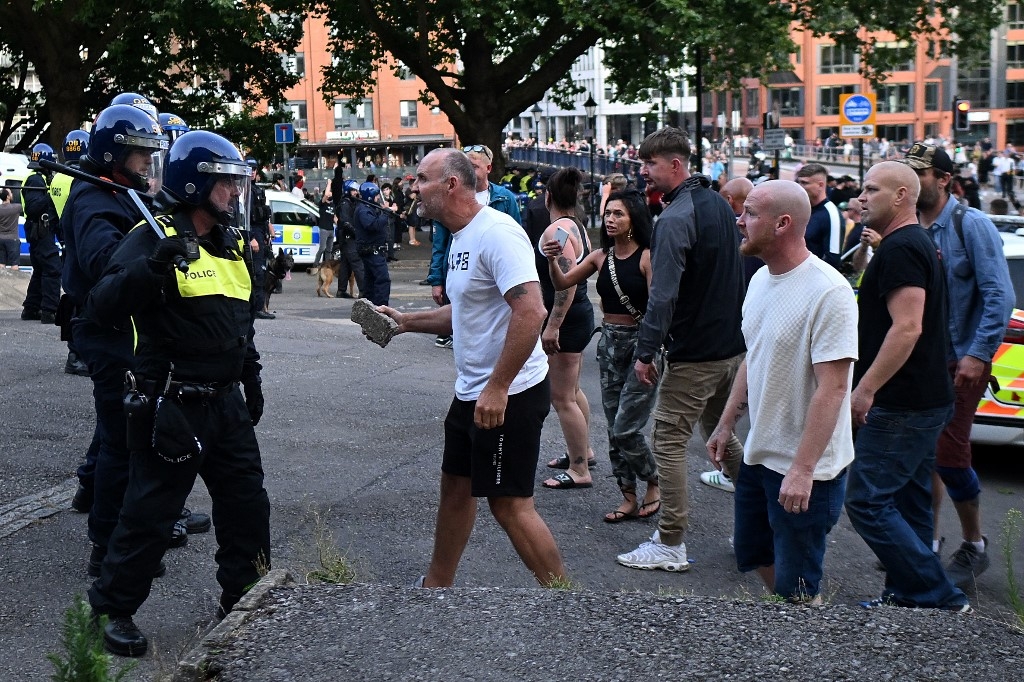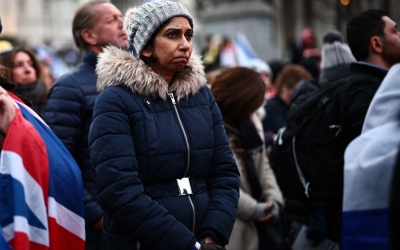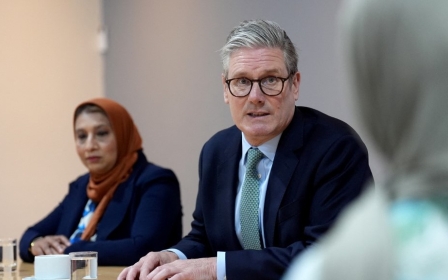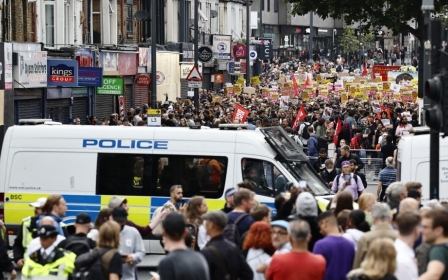Leading UK think tank: Far-right attacks taken less seriously than 'Islamist' violence

Britain’s leading defence and security think tank has said the country treats far-right attacks less seriously than "Islamist" violence, in a major intervention that contradicts the government’s approach to counter-extremism policy.
The Royal United Services Institute (Rusi) argued in an article in the Guardian on Sunday that the recent far-right riots across Britain “have exposed troubling double standards in how society perceives and responds to far-right violence compared to Islamist extremism.”
It said that far-right motivated violence is often categorised as “thuggery” or hooliganism, whereas “similar acts motivated by Islamist extremism” would likely be called “terrorism”.
Prime Minister Keir Starmer has characterised the recent violent disorder as “far-right thuggery”.
Rusi argued that the British leader’s response “downplays the organised networked, and ideological components of the riots”.
New MEE newsletter: Jerusalem Dispatch
Sign up to get the latest insights and analysis on Israel-Palestine, alongside Turkey Unpacked and other MEE newsletters
The think tank called Starmer’s reaction an “inconsistency” which hinders the political will to tackle far-right violence.
“It affects who is seen as responsible for leading the response,” researchers wrote, “often leaving it to the police rather than other actors involved in counter-terrorism and preventing and countering violent extremism work.”
Contradicting counter-extremism policy
Rusi’s comments contradict the UK’s current approach to counter-extremism, which was established by the previous Conservative government.
The government’s review of the Prevent programme, published in February 2023, called for it to prioritise the threat from Islamist extremism over far-right extremism, arguing that confronting Islamist narratives should be a “principal component of Prevent activity”.
This approach has been favoured by the current head of the Commission for Countering Extremism, Robin Simcox, who has a record of working for think tanks accused of Islamophobia.
He was initially appointed interim commissioner in March 2021 under the then-home secretary, Priti Patel, and later confirmed in the role by her successor, Suella Braverman, in July 2022.
Simcox has not publicly remarked on the recent riots.
Yvette Cooper, Labour’s then-shadow home secretary, now in government, said in February 2023 that there should be “no hierarchy of extremism” - appearing to distance Labour from the Prevent review.
In July last year Cooper gave a speech to Rusi calling on the government to “tackle hateful extremism” and recognise “the importance of neighbourhood policing to counterterrorism work”.
And Labour’s election manifesto in June promised to “update the rules around counter-extremism, including online, to stop people being radicalised and drawn towards hateful ideologies”.
This suggested that Labour planned to double down on Prevent but change it by expanding the scope of counter-extremism and removing its focus on Islamism.
Now the riots have put the spotlight on the far right.
'We need a fresh start, underpinned by basic human rights'
- Ilyas Nagdee, Amnesty International UK
Rusi called in the Guardian on Sunday for many cases of far-right violence during the riots to be labelled as “hate crimes” or “extremism”, and “severe cases” to be deemed terrorism.
Human rights campaigners have warned against the riots being used to bring in new policing powers and counter-terror laws.
Jacob Smith, UK accountability team leader at Rights & Security International, told Middle East Eye last week that expanded policing powers are “never the answer”.
“In response to major national events like these, the government often responds quickly with new counter-terrorism laws – too often these are rushed through Parliament and allow the police and the security services to violate our rights to privacy and free expression,” he said.
“Instead, it should seek to address the root causes of violence, scrapping its Prevent strategy and focus its attention on increasing funding to vital public services, which can prevent people from being drawn into violence.”
Ilyas Nagdee, racial justice director at Amnesty International UK, said that the government’s response “must be a serious one which ensures that policing is directed to protecting at-risk communities”.
He called on the government to avoid “dangerous and discriminatory” solutions like deploying facial-recognition technology or 24-hour courts.
“We need a fresh start, underpinned by basic human rights and a renewed determination to avoid the routine dehumanisation in so much recent public and political discourse,” Nagdee said.
Middle East Eye delivers independent and unrivalled coverage and analysis of the Middle East, North Africa and beyond. To learn more about republishing this content and the associated fees, please fill out this form. More about MEE can be found here.





